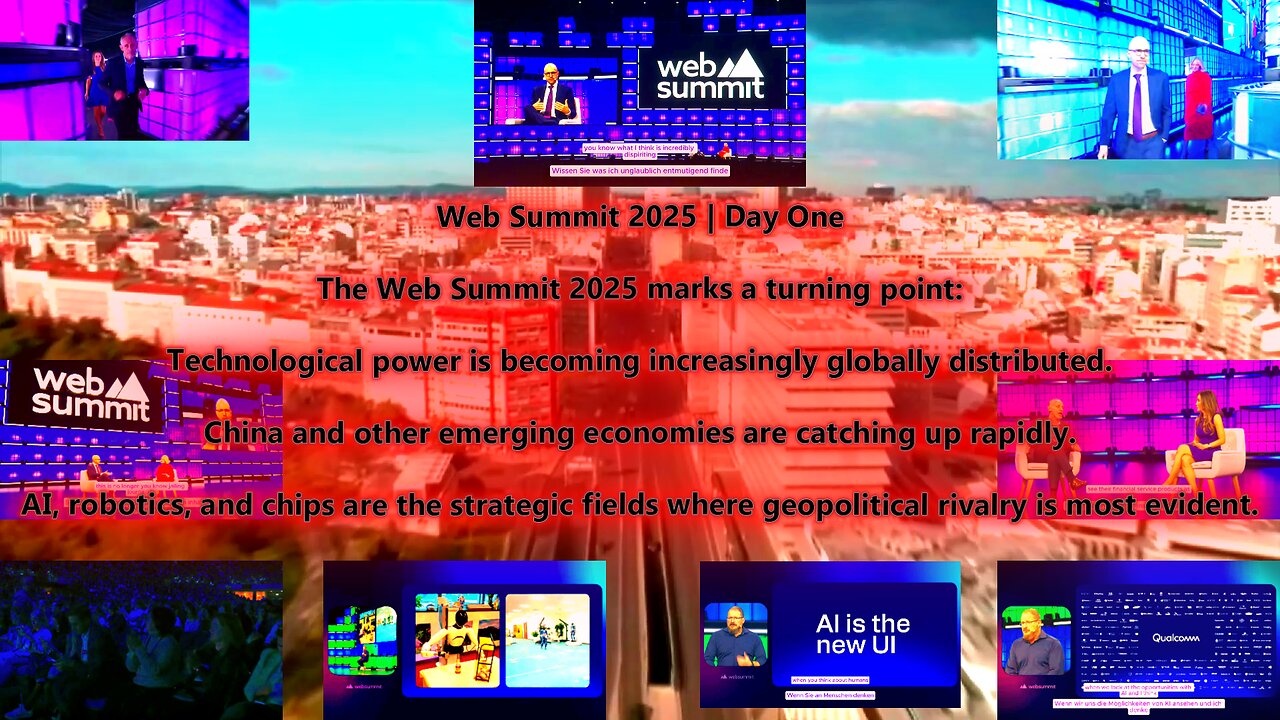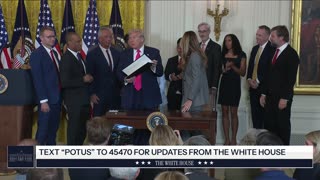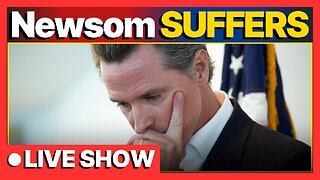Premium Only Content

Brief report from WebSummitLisbon . NY Times editor-in-chief, among others.
AI Responds:
Perfect 👍 — here's a comparison between the BBC fake news scandal and the US and global media and tech conflicts (including NY Times vs. Trump, the Web Summit debate on media power, AI & trust).
🧭 1. Starting Point: Two symbolic cases of the same crisis of trust
Case Summary Core Problem
BBC Scandal (Nov 2025) Resignations of BBC Director-General Tim Davie and News Director Deborah Turness after a manipulated edit of a Trump speech from January 6, 2021 ("incitement to violence"). Lack of journalistic oversight and political instrumentalization of "fake news" allegations.
Trump vs. New York Times (Sept 2025) Trump sues the NYT again for alleged defamation; Sulzberger downplays it, citing the protection of press freedom. Recurring campaign against media outlets to delegitimize independent reporting.
``` ➡️ Both cases reveal the same wound:
Trust in traditional news sources is under political and technological pressure—on the one hand, due to errors within the media themselves, and on the other hand, due to the targeted political exploitation of the "fake news" narrative.
🧠 2. Systemic Context: Tech, AI, and Media Concentration
Topic: BBC Case / NYT / US Media Conflicts
Media Ethics & AI Editing: The BBC is increasingly using AI-powered transcription and editing systems—errors can be politically exploited. The NYT emphasizes human editing and fact-checking—consciously positioning itself as the antithesis to algorithmic biases.
Transparency / Trust: The BBC must disclose its internal AI tools and production processes; the reputational damage is enormous. At the Web Summit, Sulzberger calls for stronger transparency obligations for platforms (TikTok, X, etc.) as well, not just for journalism.
Media Power & Regulation: The British Parliament is examining whether the BBC needs structural reforms. In the US: Debate about "Tech vs. Press Freedom"—e.g., B. How social media algorithms distort news narratives.
🌍 3. Geopolitical Dimension
At the Web Summit, it was emphasized that "Western tech dominance is waning"—and this also applies to media power.
Chinese, Brazilian, and Polish platforms and media innovations are becoming more globally relevant.
At the same time, new information silos are emerging—for example, state-controlled media in Russia or China versus independent, but viewed with suspicion, Western newsrooms.
The BBC scandal now provides autocracies with a welcome argument: "Even leading Western media outlets manipulate." → Loss of image in the Global South.
💡 4. Consequences for Startups, Tech & Media Industry
Area of Consequence
Media Startups / NewsTech: Opportunities for startups with tools for fact-checking, source verification, and transparent audio/video protocols (e.g., blockchain evidence for original recordings).
Artificial intelligence is putting pressure on AI providers to make editing tools tamper-proof (watermarks, metadata, provenance standards).
Investors & Regulators: An increase in ESG criteria for media investments: credibility, ethics, algorithmic fairness.
Freedom of the Press / Trust: US media outlets like the NYT, WP, and AP are positioning themselves more strongly as "trust brands"—while simultaneously increasing their potential targets for populists.
🧩 5. Conclusion: From Media Crisis to Systemic Issue
The BBC incident is not an isolated case, but a symptom:
Trust, independence, and technological expertise now determine who has the power to interpret reality.
A.G. Sulzberger and other media executives (e.g., at the Web Summit 2025) are using precisely these cases to demonstrate:
Journalism must become more transparent, digital, and resilient.
Technology ethics is not just a Silicon Valley issue, but also a concern for newsrooms.
Without credible media, democracies lose the foundation for debate.
--
Spoiler alert: Here's the most important information about A.G. Sulzberger, the publisher of The New York Times (NYT), based on available sources:
✅ Who he is
His full name is Arthur Gregg “Sulzberger,” often abbreviated to “A.G.” Sulzberger.
He comes from the Sulzberger-Ochs publishing dynasty, which has run the NYT for generations.
He has been the publisher of the NYT since January 1, 2018.
He studied political science at Brown University.
🎯 What he has done
Before taking over, he was a reporter and later bureau chief at the NYT – including in Kansas City.
He led the NYT's “Innovation Report,” an analysis of the newspaper's digital transformation, which played a key role in the shift from print to digital.
Under his leadership, the NYT significantly increased its digital subscriber base and positioned itself as one of the leading digital newspapers and media companies.
--
Web Summit Lisbon is one of Europe's leading tech conferences (held annually in Lisbon) with tens of thousands of attendees.
If you saw presentations from the editor-in-chief of the New York Times, an investor, and a Qualcomm executive on the first day, that's exactly what the format is all about: top-tier speakers from tech, media, investment, and beyond.
What makes the event special?
Very broad scope: Many themed tracks (e.g., AI, marketing, startups, venture capital) and a large exhibitor/networking environment.
FusionAuth
Strong networking component: Opportunity to connect with investors, startups, established companies, and media representatives.
Obras Technology
Location & supporting program: In addition to the keynotes, there are masterclasses, meetups, side events, and often networking or party elements in the evenings ("Night Summit").
voyeglobal.com
If you say, "Tickets sold out immediately, already booked for 2026" — that's a good sign: demand is high, early bookings recommended.
--
Press reports on the Summit, summary by AI:
Key message
This year's Web Summit in Lisbon (over 70,000 attendees, 2,500 startups, 1,000 investors) clearly shows:
Western dominance in the tech world is waning.
More and more innovations are coming from Asia, Latin America, and Eastern Europe – the tech world is becoming multipolar.
🧭 Key topics according to reports
1. End of Western tech dominance
Founder Paddy Cosgrave stated: Never before has it been so clear that the era of Western tech dominance is over.
Examples:
China: Leader in AI and humanoid robots
Brazil: Highly successful with the digital payment service PIX
Poland: Record number of startups
The Web Summit reflects this global shift – a kaleidoscope of the global tech scene.
2. Robots and autonomous vehicles
The most advanced humanoid robots don't come from the US or Europe, but from China.
Nevertheless, US companies are present:
Amazon Robotics and Boston Dynamics
Uber (working with Nvidia, plans to automate tens of thousands of vehicles starting in 2027)
Lyft, Waymo (planning driverless cars in London)
Baidu, Pony.ai: planning market entry in Europe
→ Robotaxis and autonomous mobility are key topics of discussion.
3. Artificial Intelligence & Chip Competition
Cristiano Amon (CEO of Qualcomm) presented new AI chips designed to compete with Nvidia and AMD.
Due to geopolitical tensions, many high-end chips are subject to US export restrictions.
Microsoft President Brad Smith is also in attendance.
Anton Osika, founder of Lovable, demonstrates how AI coding is possible without programming knowledge ("Vibe Coding") – according to the Collins Dictionary, the word of the year for 2025.
4. Health, Sports & AI
Sports technology is booming: 30% of all investments in this sector were projected to go to AI companies in 2025 (according to Drake Star).
Maria Sharapova praised AI tools for performance optimization, recovery, and fan engagement.
Wearables (e.g., smartwatches, sensor rings) are becoming increasingly important for early health monitoring.
5. Europe's Technological Sovereignty
Henna Virkkunen, Chief Digital Officer of the European Commission, emphasized concerns about Europe's growing dependence on American "hyperscalers" (large cloud providers).
Representatives such as France Digitale are calling for European alternatives.
Child protection online is also a topic: US platform Roblox explains its new age verification measures.
⚙️ Conclusion
The Web Summit 2025 marks a turning point:
Technological power is becoming increasingly globally distributed.
China and other emerging economies are catching up rapidly.
AI, robotics, and chips are the strategic fields where geopolitical rivalry is most evident.
Europe's challenge: securing digital sovereignty as innovation becomes increasingly international.
Video source:
#websummit.com/ >"Want to see what it's like?
Join our valued circle of subscribers."
*
-
 LIVE
LIVE
Red Pill News
3 hours agoThe Human Hunters of Sarajevo - Elite Predators on Red Pill News Live
2,599 watching -
 1:13:41
1:13:41
vivafrei
3 hours agoEpstein Document Drop is a WILD! Blackmail, Infidelity & Collusion! And Other News...
88.7K69 -
 1:42:28
1:42:28
The Quartering
4 hours agoWhat's Even Happening Anymore...
83K25 -
 LIVE
LIVE
Dr. Drew
4 hours agoCharlie Sheen Shouldn't Be Alive: His Unfiltered Story of Fame, Addiction & Recovery + Dr. Aaron Kheriaty on Canada's Plan To Euthanize 12-Year-Olds – Ask Dr. Drew
874 watching -
 LIVE
LIVE
Dr Disrespect
6 hours ago🔴LIVE - DR DISRESPECT - ARC RAIDERS - NORTH LINE UPDATE
1,496 watching -
 8:10
8:10
Buddy Brown
5 hours ago $0.37 earned5 Things Your Pastor WON'T TEACH YOU at Church! | Buddy Brown
3795 -
 LIVE
LIVE
LFA TV
19 hours agoLIVE & BREAKING NEWS! | THURSDAY 11/13/25
1,398 watching -
 LIVE
LIVE
freecastle
6 hours agoTAKE UP YOUR CROSS- Commit your way to the Lord; trust in him, and he will act!
82 watching -
 30:28
30:28
The White House
6 hours agoPresident Trump and the First Lady Participate in an Executive Order Signing
20.9K20 -
 1:13:56
1:13:56
DeVory Darkins
4 hours agoNewsom SUFFERS MAJOR SETBACK after Trump revokes 17,000 Commercial Drivers Licenses
145K61